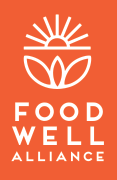What is Food Well Alliance?
Food Well Alliance, formed in partnership with Atlanta Community Food Bank, exists to connect members of Atlanta’s local food movement around building healthier communities, transforming our local food system and improving our lives.
Why does Food Well Alliance exist?
Our mission is to grow a resilient, local food movement in Metro Atlanta by connecting individuals and organizations and promoting collective action to build healthier communities.
We aspire to be a part of communities where locally-grown, healthy food is in the hands of everyone.
Why was it founded?
Like many local food movements in the US, Metro Atlanta's local food system is still in a nascent stage of development. To date, there have been very important strides made to promote the importance of local food for our health and well-being. Food Well Alliance was formed to create a way to bring together these community organizers, educators, entrepreneurs, investors and planners to strengthen the local food system.
Who are our partners?
Great organizations that are already a part of the effort to grow our local food system are at the table working with us to convene and collaborate around local food. Food Well Alliance receives its financial support from the James M. Cox Foundation.
Who is Food Well Alliance for?
Food Well Alliance works to support community organizations, educators, local food businesses, investors and planners, who have committed their time and resources to strengthen Metro Atlanta's local food system.
What is Food Well Alliance’s geographic focus?
Food Well Alliance is focused initially on the densely-populated counties of the Metro Atlanta area (Fulton, DeKalb, Gwinnett, Cobb and Clayton.), however, we hope to support more areas in the future.
What is local food?
Local food supports regional food production and distribution. It is used to improve the economic, environmental and social health of a particular area. Food is grown locally, travels shorter distances and conserves the local landscape.
What is the local food system?
A local food system includes the complex network of relationships between producers (farmers and gardeners) and all other contributors who interact with food on its journey to the consumer. A food system is driven by several principles including education, policy, outreach, nutrition, agriculture, ecology and social equity. There are five major components of a food system: production, processing, distribution, consumption and waste recovery.
Why is the local food system important?
A local food system aims to build the local and regional tiers of food production and distribution. The food system touches our daily lives in many different ways and can be used, as a tool to address community needs in the areas of health and nutrition, environmental sustainability, economic development and community vitality.
What is a “food desert”?
A food desert is an urban neighborhood or rural town that lacks access to fresh, healthy and affordable food. These areas are measured by vehicle access, distance to a grocery store, vulnerability (such as children and seniors) and poverty. Foods commonly seen in food deserts, such as fast-food restaurants and processed non-perishables, lack the nutrition that contributes to a well-rounded diet. In urban neighborhoods, a one-mile distance to grocery stores is used to consider food access in an area. A 10-mile distance marker is considered in rural areas, where the population is more sparsely distributed. (USDA)
The USDA Food Desert Atlas is a tool that was developed by the USDA in 2011 to provide analysis at the census tract level of food access. The USDA Food Access Research Atlas, released in 2012, is an updated version that includes new indicators that influence food choices and diet quality.
What is “food insecurity”?
Food insecurity is an inconsistent access to adequate food. Households deemed food insecure operate in a state of uncertainty of how they will access their next meal. Food security means all people at all times can access enough food for an active, healthy life. While high food security indicates no reported food access problems, food insecurity indicates reports of reduced quality, variety, or desirability of diet, or multiple disrupted eating patterns and reduced food intake. (ACFB Hunger in America Report)
What is Atlanta's Local Food Movement?
Atlanta's Local Food Movement understands the commitment and innovation required to build a resilient local food system. They work tirelessly to improve the local food system. These are our urban growers, compost experts, educators and community organizers - some of our city’s greatest leaders who are paving the way for a more resilient local food system through their commitment to locally-grown food.
These leaders play a critical role in increasing access to locally-grown food, improving health outcomes, building community, improving our natural environment and galvanizing our local food economy.
What is a Working Table?
One of the ways Food Well Alliance addresses the opportunities in the local food system and helps jumpstart new solutions is by bringing leaders from specific areas of the local food movement together to form what we call Working Tables. Participants include community organizers, educators, local food entrepreneurs, planners and investors.
For each of these groups, Food Well Alliance facilitates regular meetings using a methodology that results in collectively identifying needs, sharing measurement and data, aligning priorities and making recommendations.
Each Working Table is intentionally diverse, representing different cultural backgrounds, experience and technical expertise. Each group includes innovators we call disruptors, because they fire up the creativity of people around them and build new bridges inside our community.
How can I submit events and news for promotion?
Our Blog is full of exciting news and events thanks to many organizations that help to keep the local food system buzzing. If you are interested in adding news & events to the Food Well Alliance website, send details to info@foodwellalliance.org.



